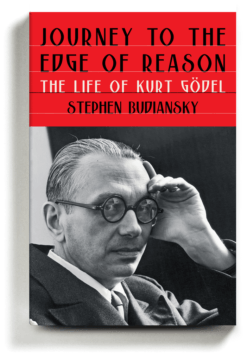Jennifer Szalai at The New York Times:
 Gödel could go for long walks with his fellow institute scholar Einstein, who sponsored Gödel’s citizenship application and called him the greatest logician since Aristotle, but he was wracked by physical ailments and nervous conditions. A doctor told him he had a bleeding ulcer, which he strangely refused to believe, even though he was also a self-medicating hypochondriac. He subscribed to all sorts of conspiracy theories, insisting that “nothing happens without a reason,” and that the reason was almost always a hidden one. The unlimited freedom he had at the institute proved to be double-edged, Budiansky observes. In one sense, it saved Gödel’s life; but it also allowed his consciousness to wander into the darkest places, without the checks on his expansive anxieties that interactions with the ordinary world might have otherwise provided.
Gödel could go for long walks with his fellow institute scholar Einstein, who sponsored Gödel’s citizenship application and called him the greatest logician since Aristotle, but he was wracked by physical ailments and nervous conditions. A doctor told him he had a bleeding ulcer, which he strangely refused to believe, even though he was also a self-medicating hypochondriac. He subscribed to all sorts of conspiracy theories, insisting that “nothing happens without a reason,” and that the reason was almost always a hidden one. The unlimited freedom he had at the institute proved to be double-edged, Budiansky observes. In one sense, it saved Gödel’s life; but it also allowed his consciousness to wander into the darkest places, without the checks on his expansive anxieties that interactions with the ordinary world might have otherwise provided.
more here.
